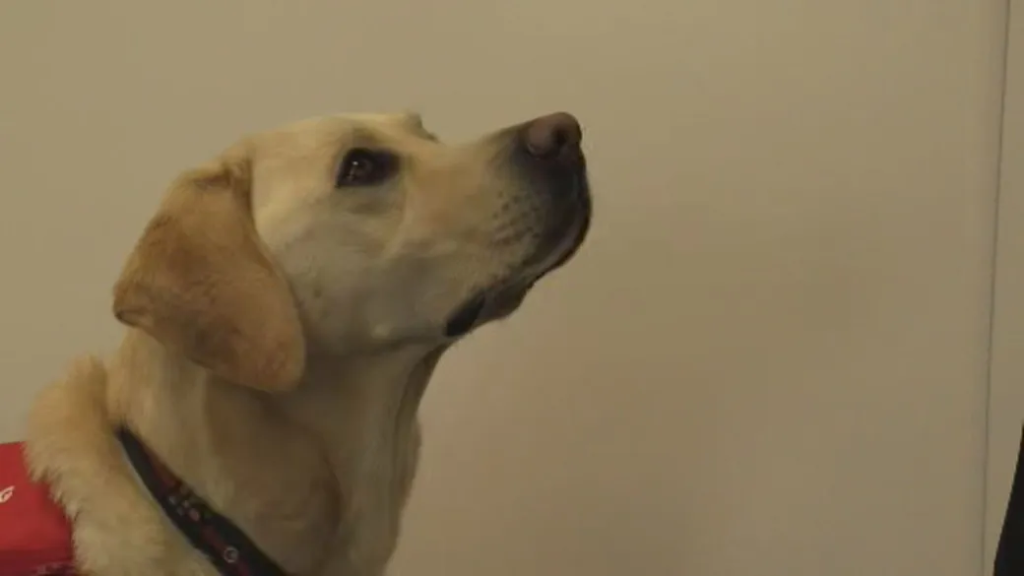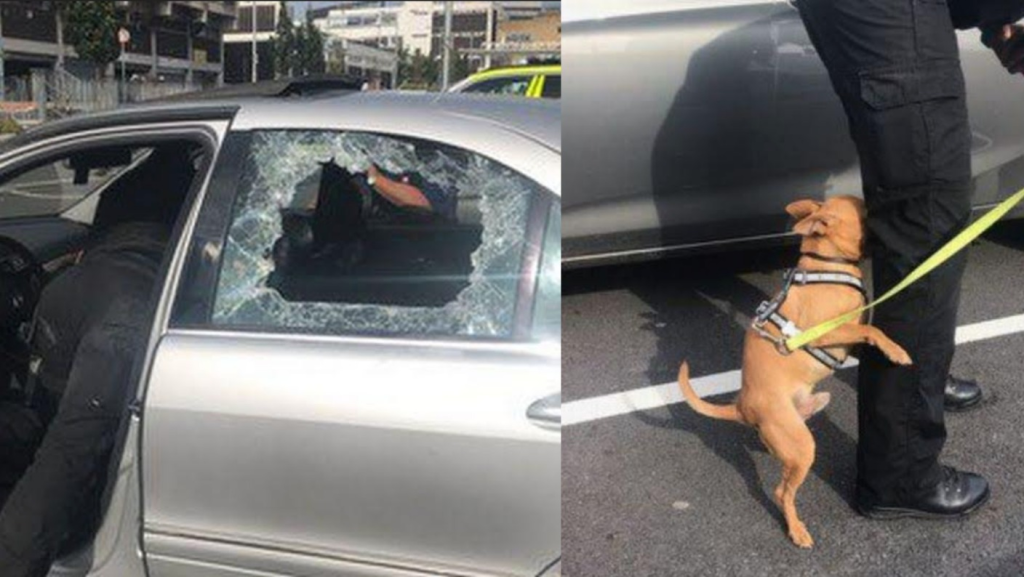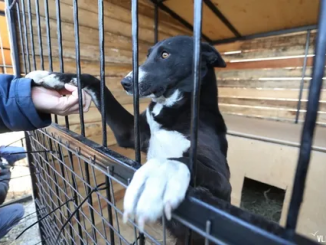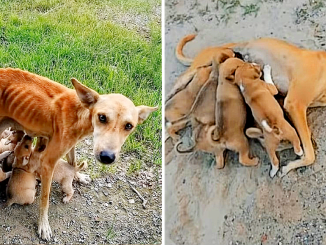
As the availability of COVID-19 tests dwindle across Canada, another option to detect the virus in the form of a furry friend may be the next best thing.
Multiple studies show that dogs can be more effective, faster and potentially less expensive than the current tests on the market.
The research has grown since 2020, with University of California Santa Barbara professor Tommy Dickey finding the collective research shows trained scent dogs are “as effective and often more effective” than both the rapid antigen tests many people keep in their homes, and even the PCR tests deployed at clinics and hospitals.
But even with studies showing their effectiveness, COVID-19-detecting dogs are deployed only in certain jurisdictions in various countries.
One such place is the Canines for Care program at Vancouver Coastal Health (VCH), which started looking into the possibility of training dogs to detect COVID-19 in early 2021.
Dr. Marthe Charles, division head of medical microbiology and infection prevention and control at VCH, said the idea stemmed from the early reliance on laboratory testing.
“I think there was a will from public health at the time and also from the various levels of government to try to find a way that was fast, accurate and non-invasive to be able to detect and train as many people as possible,” Charles told Global News in an interview.
Three dogs — two Labrador retrievers and an English springer spaniel — were brought in for training. The dogs were exposed to items such as masks that were worn by patients either negative or positive for the virus. This trained the dogs to recognize what is and is not COVID-19.

Charles said the dogs were trained since being puppies to associate the scent of COVID-19 with food and were rewarded each time they correctly detected a positive case of the virus.
“So from early on in their lives, they’ve associated the scent of a case of COVID to a rewarding scent,” she explained.
This reward method is not just used by VCM. It was also used with a group of dogs sourced in early 2021 for a French study, trained at detection using toys — usually tennis balls — as rewards.
Dr. Carla Simon, owner of Hunter’s Heart Scent Detection Canines in Calgary, said this method of training dogs is common. By using rewards, it can help motivate them to find the scent.
“We would pair, let’s say, the sweat samples with COVID, with their reward, and they notice that every time they find their reward, there’s that special smell,” she explained. “We just have to make it rewarding for the dog.”
She added, however, that the dog chooses the reward so trainers can ensure the canines “show up every day and want to do their job.”
Earlier this month, Dickey along with Heather Junqueira of BioScent, Inc. gathered several peer-reviewed studies into a review that was published in the Journal of Osteopathic Medicine. Dickey said the number of peer-reviewed studies over the past few years went from four to 29, incorporating the work of more than 400 scientists from more than 30 countries and 31,000 samples.
The review noted the effectiveness of dogs’ ability to detect COVID-19 comes down to their noses.

“The nose is not like humans,” Simon said. “It’s massively different, orders of magnitude different, and they can detect things without us being able to smell them.”
Humans have about five to six million olfactory receptors in their noses, while dogs have hundreds of millions. One-third of their brain is devoted to the interpretation of smell — something only five per cent of a human’s brain is committed to, according to Dickey’s review.
The study found dogs’ noses may even be able to detect pre-symptomatic COVID-19 cases, or even those who will develop symptoms later.
Dickey told us in an interview that this could help limit or stop the virus from spreading.
“The longer the wait is between your test and your result, that’s a latent period,” he said. “During that time you’re running around spreading COVID and you don’t know it. The dogs with a direct sniff will be done in seconds.”
Many of the studies conducted, including the work at VCH through the Canine for Care program, have shown dogs’ ability to detect the disease correctly with a success rate of more than 90 per cent. Additionally, the studies also showed a high speed at which the dogs could identify cases. In one study in Thailand, researchers reported the dogs had gone through thousands of samples in just a few weeks.
“The dogs take only one to two seconds to detect the virus per sample. Once they detect a patient, they will sit down,” said Chulalongkorn University professor Kaywalee Chatdarong, who led the 2021 project. “This takes only one to two seconds. Within one minute, they can manage to go through 60 samples.”
Even though the research suggested deploying scent-detection dogs could also be less expensive than rapid or PCR tests, Charles cautioned the logistics that go into training the dog is where it becomes “more prohibitive.”

In VCH’s case, training of the dogs included the medical microbiology lab to provide samples for use, working with infection prevention teams and control nurses, and if a dog identifies an area of concern, cleaning services may need to be utilized. And when it comes to rolling out testing using the dogs, enough staffing is needed for mass screening.
Despite this, while Charles says deploying the dogs widely could be difficult due to staffing and training, they are still one of several tools that can be used in COVID-19 detection.
“I think the way to see those dogs from my perspective is really like another tool in the toolbox and trying to prevent further transmission of pathogen of concern,” she said.
Dickey and Junqueira say dogs should have a place in “serious diagnostic methodology” including in helping should the world face a future pandemic.
Police smash car window to save dog from 115F heat

Police were forced to smash a car window to rescue a dog from scorching 115F (46C) temperatures in Sarasota, Florida.
Officers were called to a car park on University Parkway on Tuesday following reports of a dog locked inside a car.
A dog, appearing faint, was found inside with no trace of its owner. According to police, the temperature inside was 115F (46C).
Matthew Grochowski, an officer for the Sarasota Police Department, was filmed smashing the window of the car in body camera footage of the incident, shared to Facebook on Friday.
“It’s panting and and drooling all over the place”, the officer says in the footage.
“Oh my god he’s starting to go down, that’s not good,” another officer, from the Sarasota County Sheriff’s Office Animal Services, adds.
With the backing of Sgt Louis Buck, the officer was filmed striking a back window of the car, and smashed it on the third try, with glass falling to the floor.
“It’s OK buddy,” the officer tells the dog, which appeared to be a form of pit bull. “Come on, good boy.”
The dog was taken from the back of the car, and into an awaiting kennel by Sarasota animal services.

Following the incident, the Sarasota Police Department issued a warning for dog owners not to lock animals inside cars.
“Please don’t leave pets in hot cars,” said the post, “[and] always remember to look before you lock for pets, children and elderly loved ones.”
The owner of the dog was issued with two citations by Animal Services, who returned the dog.



Leave a Reply